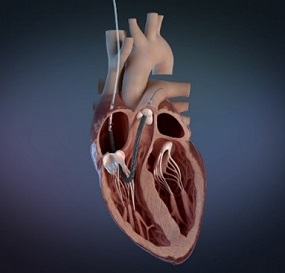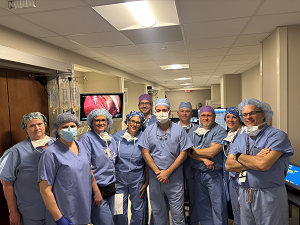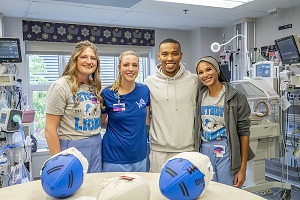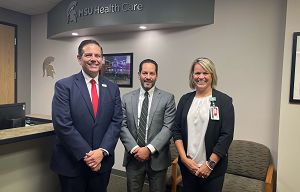Henry Ford Health Cardiologists First in Michigan to Use Heart Recovery Technology

DETROIT (April 25, 2023) – Interventional cardiologists at Henry Ford Health are the first in Michigan to treat a patient using the Impella RP Flex with SmartAssist, one of the world’s smallest heart pumps.
The innovative pump, which provides temporary right heart mechanical circulatory support, allows Henry Ford Health physicians provide more comprehensive and advanced care options to patients in Michigan experiencing acute right heart failure.
“Henry Ford Health is recognized as the leading provider of cardiovascular care in our region and beyond,” said Khaldoon Alaswad, M.D., an interventional cardiologist and medical director of the Cardiac Catheterization Laboratory at Henry Ford Hospital. “The new heart pump provides our physicians an innovative tool to treat patients experiencing right heart failure.”
The Impella RP Flex technology received U.S. FDA pre-market approval in October 2022 as safe and effective to treat acute right heart failure or decompensation for up to 14 days following left ventricular assist device implantation, myocardial infarction, heart transplant or open-heart surgery. The pump is implanted via the internal jugular vein, which enables patient mobility, and its dual-sensor technology is designed to optimize patient management. 
“The heart pump’s novel technology allows us to treat right heart failure more effectively,” said Akshay Khandelwal, M.D., MBA, an interventional cardiologist and associate division head of Cardiology at Henry Ford Health. “By allowing a patient’s own heart to rest and recover, we can help improve their quality of life.”
Henry Ford Health Heart & Vascular teams specialize in diagnosing and treating cardiovascular conditions using minimally invasive techniques. Many of these procedures take place in cardiac catheterization labs. The cardiac cath lab is a special examination room featuring state-of-the-art equipment and specially trained staff who carry out procedures using catheters to access patients’ hearts and surrounding structures through tiny incisions. Henry Ford Hospital was also first in Michigan to use the radial approach technique to access the heart using radial artery in patients’ wrists, allowing most patients to go home the same day as their procedure.
Globally, more than 250,000 patients have benefited from the Impella heart pump support, developed by Abiomed, a medical device technology company based in Massachusetts.
Visit henryford.com/services/heart-and-vascular to learn more about Henry Ford Health’s Heart and Vascular services.
###
MEDIA ONLY MAY CONTACT: Sal Giacona / sgiacon1@hfhs.org / 313-421-9108
ABOUT HENRY FORD HEALTH
Serving communities across Michigan and beyond, Henry Ford Health is committed to partnering with patients and members along their entire health journey. Henry Ford Health provides a full continuum of services – from primary and preventative care, to complex and specialty care, health insurance, a full suite of home health offerings, virtual care, pharmacy, eye care and other healthcare retail.
It is one of the nation’s leading academic medical centers, recognized for clinical excellence in cancer care, cardiology and cardiovascular surgery, neurology and neurosurgery, orthopedics and sports medicine, and multi-organ transplants. Consistently ranked among the top five NIH-funded institutions in Michigan, Henry Ford Health engages in more than 2,000 research projects annually. Equally committed to educating the next generation of health professionals, Henry Ford Health trains more than 4,000 medical students, residents and fellows every year across 50+ accredited programs.
With more than 33,000 valued team members, Henry Ford Health is also among Michigan’s largest and most diverse employers, including nearly 6,000 physicians and researchers from the Henry Ford Medical Group, Henry Ford Physician Network and Jackson Health Network.
The health system is led by President and CEO Robert G. Riney and serves a growing number of customers across 250+ locations throughout Michigan including five acute care hospitals, two destination facilities for complex cancer and orthopedics and sports medicine care, three behavioral health facilities, primary care and urgent care centers.
.svg?iar=0&hash=F6049510E33E4E6D8196C26CCC0A64A4)

/hfh-logo-main--white.svg?iar=0&hash=ED491CBFADFB7670FAE94559C98D7798)









